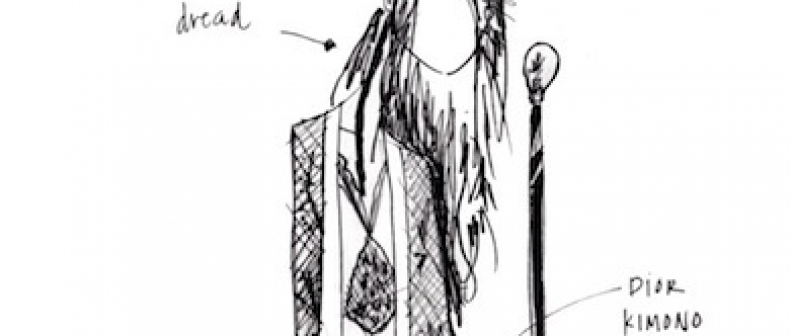
Generation Y is an entitled generation. The same people that tell us how entitled we are today also once told us we could be anything we wanted to be. Their voices have shifted, their tones growing colder as they spit: Be smart, grow up, be thin, get good grades, find someone, figure it out, and realize how lucky you are. That’s fine. I tell myself all of these things as well. Ideally, and I don’t think I speak for myself here, I’d like to do and be all of these things. Yet as we continue in our attempts to gain stable footing in a world without social codes or available paying jobs, our egos continue to turn darker shades of purple, and we insist on protecting them the only way we know how– with entitlement and irony. It should come as no surprise, then, that many of the voices of Generation Y are as entitled and ironic as Donald Trump in an ugly Christmas sweater. They make us laugh and cry, but we hang onto each of their words with fervour– falling more in love with them one open tab at a time.
“My generation (Generation Y) is growing up in a world without social codes. For the most part, men are no longer ‘gentlemen’ and women are no longer ‘ladies.'” Rather we feel more comfortable getting naked and having sex within the first few hours of meeting each other, but coffee and dinner dates are intense and scary,” writes Miranda Frum of the Huffington Post. Many of us have become afraid of displaying our true selves, with their human flaws and awkward tendencies. Our ‘true’ selves have been shut out- they’ve been told ‘no,’ they’ve been rejected– after all the praise we had growing up, we didn’t see it coming. We soon realized rejection was easier to handle if the subject being rejected wasn’t entirely our own. As a generation, we’ve decided we feel more comfortable binge-drinking to escape ourselves, and making out with strangers in dark rooms– many of whom we’ll never see or talk to again. Our yearning for a past with respectable romantic norms is silenced by our fear of vulnerability. Hiding behind the veil of a computer screen, or escaping with a mickey of vodka feel like comfortable solutions to us. During sober waking life we savour irony because it makes us laugh, pulling us out of whatever first world predicament we find ourselves in. Irony camouflages the person we are with a convenient dose of deflective humour.
I don’t believe irony is the vice Christy Wampole’s viral New York Time’s article argues it is. In her attack on our ironic twenty-first century culture she argues that our technological dependance has stripped us of, “the art of conversation, the art of looking at people, the art of being seen, the art of being present. Our conduct is no longer governed by subtlety, finesse, grace and attention, all qualities more esteemed in earlier decades. Inwardness and narcissism now hold sway.” Wampole crafts a deliciously true point, one which I believe many Gen Y’ers would nod at in silence. What she omits, however, is that the canvas where we paint our voices has changed. The power of them is no longer only measured by the tenacity of our conversations and ability to write clear and succinct sentences. Instead, the power of a voice is now measured by the number of Twitter followers tied to it, or the amount of YouTube hits it has garnered.
In all our shortcomings with the internet, finding a partner, and seeking a paying job that we’re proud of, we have inadvertently slathered on entitlement and irony in a protective layer as thick as lip balm in January. It should be no surprise then that many of the voices Gen Y’ers identify with are the voices of the self entitled and ironic. To name a few: Lena Dunham’s Girls, obnoxious rappers spitting about their piles of money and how “you only live once,” Cat Marnell’s self-indulgent Amphetamine Logic, and Babe Walker’s White Girl Problems. The snap-judgements from some haven’t prevented any of the aforementioned to step down. The criticism hit like a ruler, smacked their skin and left it red as poppies in December. Then, as criticism leads to web traffic, views and exposure, each voice went on, with a larger following and stronger voice.
When Judd Apatow was asked about the backlash caused by his show Girls, he said: “We wanted it. That’s the point of it, really. It’s supposed to be a comedy about women in New York who are really smart, but their lives are a mess. They know they should be doing great things, but they don’t know what it is, and they have kind of a feeling of self-entitlement about it. That’s the joke of the show.”
In an entirely unrelated yet very similar statement, the fictional Babe Walker explained what prompted her to release her first book, saying: “You know, I really didn’t know what I wanted to *be*. I tried fashion design and was amazing at it, but it got boring. I tried my hand at philanthropy, which was cute but also boring. And it turns out I’m, like, really good at talking about my life. I guess I didn’t want to write my book, per se—it’s more that my book wanted to be written by me.”
It’s not a coincidence that these two voices of Generation Y are on the same page entirely. While White Girl Problems was created by three writers seeking to create a parody on the minute problems which face white girls of the first world, as their Twitter following grew, they soon realized Walker’s voice was resonating on a level higher than satirical parody. As it turns out, White Girl Problems are all around us. There are those who only admit to liking Walker on an ironic level. Or claim to only have read her book, followed her Twitter, and been regular visitors to her website for her refreshingly blunt delivery of fashion trends. Perhaps they aren’t lying, yet for so many people to fall in love with the fictional Walker, despite her obviously racist brand, I believe there is something more that we are purposely omitting. We keep coming back to her because secretly, we see some of ourselves in her. We laugh in defence of tears, joke in ironic slurs, and relish that Walker is even more entitled than we are, yet has still managed to “make it.”
Her tendency towards materialism is something we relate to because material objects have never questioned or left us, they’ve only helped us to further mask the people we truly are; the people we’re afraid of. For this reason Walker’s fashion coverage has gained increasing respect. She may be an entitled prick (something we’d never dream of being, of course) but her style prompts hundreds of thousands to ask: “What should I wear to ____,” “What did you think of Rodarte’s S/S 2013 line?” and, “Celine Bags, still chic or no?” Her blunt answers ring as truthful facts in a fashion world largely populated by bloggers willing to say anything nice if only to gain a seat at a fashion show, or a free Proenza Schouler bag. With fashion criticism falling by the wayside in order for people to gain endorsements, good graces and free swag, Walker struts around unaffected. As many continue to try and prove how amazing their lives are through Twitter, Facebook, and Instagram, Walker isn’t afraid to display the secret thoughts which plague us like Facebook event invitations, tweeting: Judging me will only make you fat, it’s 5:16. How much weight can I lose by 8:00?, I feel like I could be having more fun right now, it’s hard to say nice things to people, my dreams never come true, and Dear Dad, everything’s your fault. Love, me.
According to Christy Wampole, and many of the other critics of Generation Y, the high road we should take in our quest to grow up is to ignore these statements entirely because they are racist, dishonest, juvenile and self-entitled. I don’t believe that this is a viable solution to our entitlement problem. In order to overcome it, maybe we need to acknowledge that it has become part of the fabric of our generation. We’ve sewn ourselves together with irony and self-removed internet personas. We’ve glued on the mentality of “I deserve this,” because we haven’t gotten what we wanted, or what we expected. We don’t need to rip ourselves apart and start over again. Instead, I think the unapologetic Babe Walker could help us find our own paths forward as we attempt to carve stepping stones out of chaos: “Be honest. Be generous. Be alive. Be dead. Be chic. Be gay. Be me. Be you. #whitegirlproblems“
____
Claudia McNeilly writes for the Toronto Standard. You can follow her on twitter at @claudiamcneilly
For more, follow us on Twitter @TorontoStandard and subscribe to our newsletter.














